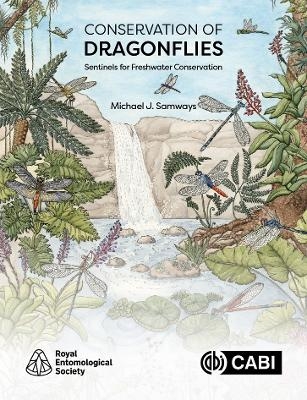
Conservation of Dragonflies
CABI Publishing (Verlag)
978-1-78924-837-1 (ISBN)
Dragonflies are among the most familiar and popular of all insects, deeply embedded in human cultural history. They are iconic and tell us much about the environments in which we and they live. Their conservation is an important part of biodiversity conservation. One modern dragonfly species is listed as extinct, with many others currently threatened. It is now essential to increase conservation efforts towards saving these threatened species, with strategies now available for doing this. Recovery of dragonfly populations goes hand in hand with improvements to both freshwater conditions and bank vegetation quality. In contrast, some other dragonfly species have benefitted greatly from human transformation of the landscape, with artificial ponds in particular, increasing the population levels of many species. In turn, climate change is seeing many geographical range shifts. Dragonflies are variously sensitive to the health of freshwater systems, and the quality of vegetation along rivers and around ponds. Dragonflies are excellent indicators in these times of great concern over the quality of our freshwater supplies. Their wide range of sensitivities enables us to measure the extent to which freshwater ecosystems are either deteriorating or are improving when we undertake restoration. They enable us to gauge how well we are conserving freshwaters, whether ponds and lakes, streams or rivers. They are also good umbrellas for many other freshwater inhabitants, which altogether reflect the health of a freshwater system. Conservation of Dragonflies: Sentinels for Freshwater Conservation is for naturalists, citizen scientists, entomologists and conservation scientists, as well as practitioners and policy makers around the world.
Michael Samways, Fellow of the Royal Society of South Africa and Member of the Academy of Science of South Africa, is a Distinguished Professor in the Department of Conservation Ecology & Entomology, Stellenbosch University, South Africa. He focuses on all aspects of insect conservation, both nationally and internationally. Michael is recipient of the John Herschel Medal of the Royal Society of South Africa, the Senior Captain Scott and Gold Medals of the South African Academy of Science and Arts, and Gold Medal of the Academy of Science of South Africa. He received the life-time Stellenbosch University Chancellor's Award, and IUCN/Species Survival Commission Chair's Citation of Excellence. He and his team, the Mondi Ecological Networks Programme, were named Winner of the NSTF-South32 Award.
1.: Introduction 2.: Dragonfly functional morphology 3.: Dragonfly diversity and distribution 4.: A trait perspective on dragonfly conservation 5.: Stressors on freshwater ecosystems and dragonflies 6.: Dragonfly conservation action 7.: Freshwater assessment and monitoring using dragonflies 8.: Future-proofing freshwaters and their dragonfly sentinels
| Erscheinungsdatum | 22.08.2024 |
|---|---|
| Verlagsort | Wallingford |
| Sprache | englisch |
| Maße | 189 x 246 mm |
| Themenwelt | Naturwissenschaften ► Biologie ► Ökologie / Naturschutz |
| Naturwissenschaften ► Biologie ► Zoologie | |
| ISBN-10 | 1-78924-837-X / 178924837X |
| ISBN-13 | 978-1-78924-837-1 / 9781789248371 |
| Zustand | Neuware |
| Informationen gemäß Produktsicherheitsverordnung (GPSR) | |
| Haben Sie eine Frage zum Produkt? |
aus dem Bereich


